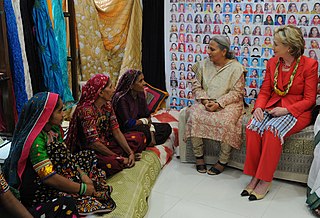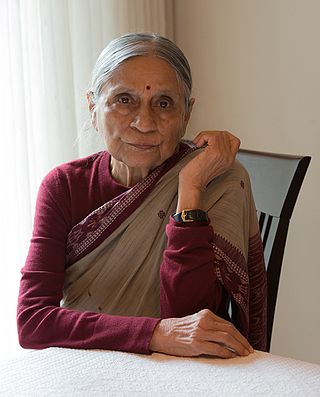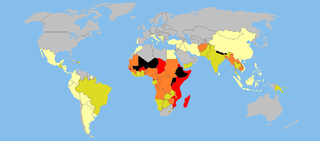Related Research Articles

An informal economy is the part of any economy that is neither taxed nor monitored by any form of government. Although the informal sector makes up a significant portion of the economies in developing countries, it is sometimes stigmatized as troublesome and unmanageable. However, the informal sector provides critical economic opportunities for the poor and has been expanding rapidly since the 1960s. Integrating the informal economy into the formal sector is an important policy challenge.

In macroeconomics, the labor force is the sum of those either working or looking for work :

Self-Employed Women's Association (SEWA), meaning "service" in several Indian languages, is a trade union based in Ahmedabad, India, that promotes the rights of low-income, independently employed female workers. Nearly 2 million workers are members of the Self-Employed Women’s Association across eight states in India. Self-employed women are defined as those who do not have a fixed employer-employee relationship and do not receive a fixed salary and social protection like that of formally-employed workers and therefore have a more precarious income and life. SEWA organises around the goal of full employment in which a woman secures work, income, food, and social security like health care, child care, insurance, pension and shelter. The principles behind accomplishing these goals are struggle and development, meaning negotiating with stakeholders and providing services, respectively.

Ela Ramesh Bhatt was an Indian cooperative organiser, activist and Gandhian, who founded the Self-Employed Women's Association of India (SEWA) in 1972, and served as its general secretary from 1972 to 1996. She was the chancellor of the Gujarat Vidyapith from 7 March 2015 to 19 October 2022. A lawyer by training, Bhatt was a part of the international labour, cooperative, women, and micro-finance movements and won several national and international awards, including the Ramon Magsaysay Award (1977), Right Livelihood Award (1984) for "helping home-based producers to organise for their welfare and self-respect" and the Padma Bhushan (1986).

Women in Informal Employment: Globalizing and Organizing (WIEGO) is a Manchester-based global research - policy network focused on improving conditions for workers in the informal economy. WIEGO's members include membership-based organizations of workers in the informal economy, researchers and development professionals.
Ruth Manorama is a Dalit social activist from Bangalore, India who fights for Dalit women's rights, the rights of domestic workers and those in the unorganized labour sector, as well as urban slum dwellers. In 2006, she was awarded the Right Livelihood Award.
The economic development in India followed socialist-inspired politicians for most of its independent history, including state-ownership of many sectors; India's per capita income increased at only around 1% annualised rate in the three decades after its independence. Since the mid-1980s, India has slowly opened up its markets through economic liberalisation. After more fundamental reforms since 1991 and their renewal in the 2000s, India has progressed towards a free market economy. The Indian economy is still performing well, with foreign investment and looser regulations driving significant growth in the country.
Labour in India refers to employment in the economy of India. In 2020, there were around 476.67 million workers in India, the second largest after China. Out of which, agriculture industry consist of 41.19%, industry sector consist of 26.18% and service sector consist 32.33% of total labour force. Of these over 94 percent work in unincorporated, unorganised enterprises ranging from pushcart vendors to home-based diamond and gem polishing operations. The organised sector includes workers employed by the government, state-owned enterprises and private sector enterprises. In 2008, the organised sector employed 27.5 million workers, of which 17.3 million worked for government or government owned entities. The Human Rights Measurement Initiative finds that India is only doing 43.9% of what should be possible at its level of income for the right to work. Employees are routinely taken advantage of by their employers because of loose labour laws across all industries in India.

A significant proportion of children in India are engaged in child labour. In 2011, the national census of India found that the total number of child labourers, aged [5–14], to be at 10.12 million, out of the total of 259.64 million children in that age group. The child labour problem is not unique to India; worldwide, about 217 million children work, many full-time.

Dr. Vina Mazumdar was an Indian academic, left-wing activist and feminist. A pioneer in women's studies in India, she was a leading figure of the Indian women's movement. She was amongst the first women academics to combine activism with scholarly research in women's studies. She was secretary of the first Committee on the Status of Women in India that brought out the first report on the condition of women in the country, Towards Equality (1974). She was the founding Director of the Centre for Women's Development Studies (CWDS), an autonomous organisation established in 1980, under the Indian Council of Social Science Research (ICSSR). She was a National Research Professor at the Centre for Women's Development Studies, Delhi.

Mirai Chatterjee is a leader of the Self-Employed Women's Association, SEWA (India). She joined SEWA in 1984 and was its General Secretary after its Founder, Ela Bhatt.
Harjit Singh Anand is a former senior administrator in the Government of India and former co-president of the EuroIndia Centre, Professor at the Centre for Study of Administration of Relief (Delhi) and President of the Working Group on Famine and Society of the International Sociological Association.

Martha Chen is an American academic, scholar and social worker, who is presently a lecturer in public policy at the Harvard Kennedy School and senior advisor of the global research-policy-action network WIEGO and a member of the Advisory Board of the United Nations University World Institute for Development Economics Research (UNU-WIDER). Martha is a development practitioner and scholar who has worked with the working poor in India, South Asia, and around the world. Her areas of specialization are employment, poverty alleviation, informal economy, and gender. She lived in Bangladesh working with BRAC, one of the world's largest non-governmental organizations, and in India, as field representative of Oxfam America for India and Bangladesh for 15 years.
The National Commission for Enterprises in the Unorganised Sector (NCEUS) is a national body commissioned by the Indian government to address the issues faced by enterprises in relation to the unorganised sector
The National Centre for Labour or NCL formally came into being in May 1995 in Bangalore, Karnataka State, India. The creation of NCL as a national confederation of Labour organisation in the unorganised / Informal sector of India was the outcome of a study of informal sector organisations that concluded that the absence of a collective voice for the informal sector workers / labour at the national level resulted in their concerns not being effectively addressed at the national level. NCL was constituted by its founding organisations namely National Federation of Construction Labour (NFCL), Self Employed Women’s Association (SEWA), National Fish Workers Forum (NFF), Sarva Shramik Sangh, Van Mazdoor Mandal, Kamani Employees Union and other independent trade unions.

Street Vendors Act, 2014 is an Act of the Parliament of India enacted to regulate street vendors in public areas and protect their rights. It was introduced in the Lok Sabha on 6 September 2012 by then Union Minister of Housing and Urban Poverty Alleviation, Kumari Selja. The Bill was passed in the Lok Sabha on 6 September 2013 and by the Rajya Sabha on 19 February 2014. The bill received the assent of the President of India on 4 March 2014. The Act came into force from 1 May 2014.
Manju Bharat Ram was an Indian educationist, who was the founder, chairperson of the managing committee and member of the board of trustees of The Shri Ram Schools, New Delhi; ranked as India's No. 1 day school by Education World’s Schools survey in 2008, 2009 and 2011.
Universal basic income in India refers to the debate and practical experiments with universal basic income (UBI) in India. The greatest impetus has come from the 40-page chapter on UBI that the Economic Survey of India published in January 2017. It outlined the three themes of a proposed UBI programme:

Reema Nanavaty is an Indian developmental worker based in Ahmedabad, India. She has been active for three decades in organising women into co-operative organisations, enterprises and trade unions in India. She is the director of SEWA and is credited for building women's livelihoods and enterprises within eighteen states in India as well as in neighbouring countries such as Afghanistan, Sri Lanka, Nepal and Bhutan.
Unorganised Workers' Identification Number or UWIN is a proposed unique number to be issued as identity proof to unorganised workers in India.
References
- ↑ "Author Page". openDemocracy. Retrieved 10 March 2020.
- ↑ "Padma Awards Directory (1954–2009)" (PDF). Ministry of Home Affairs. Archived from the original (PDF) on 10 May 2013.
- 1 2 3 4 5 "Curriculum Vitae of Ms. Renana Jhabvala" (PDF). Indian Institute for Human Settlements. 2016. Archived (PDF) from the original on 3 May 2023. Retrieved 23 August 2023.
- ↑ Jhabvala, Renana (27 February 2012). "Celebrating Women's Leadership". India International Centre. Archived from the original on 14 May 2018. Retrieved 13 May 2018.
- 1 2 "Indian Institute for Human Settlements | Renana Jhabvala" . Retrieved 10 March 2020.
- ↑ "Governance". 15 September 2021.
- 1 2 3 4 5 "Governance". SEWA Bharat. Retrieved 22 February 2021.
- ↑ "History". SEWA Bharat. Retrieved 22 February 2021.
- 1 2 3 4 "Renana Jhabvala". Ideas for India. Retrieved 22 February 2021.
- ↑ "About Us". HomeNet South Asia. Retrieved 20 February 2021.
- ↑ "Renana Jhabvala". HACHETTE India. Retrieved 22 February 2021.
- ↑ "Renana Jhabvala". next billion. Retrieved 22 February 2021.
- ↑ "Padma Awards" (PDF). Ministry of Home Affairs, Government of India. 2015. Retrieved 21 July 2015.